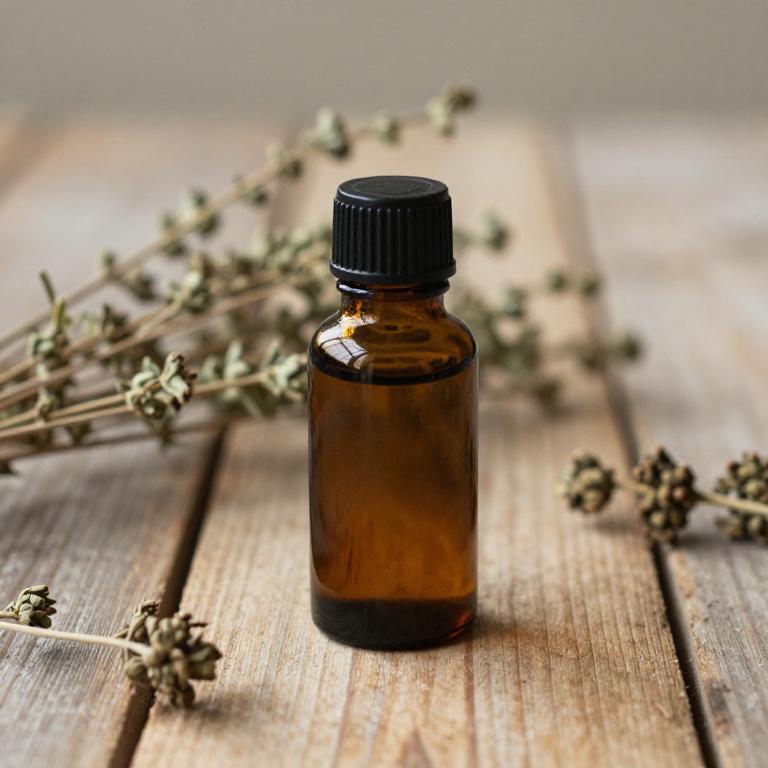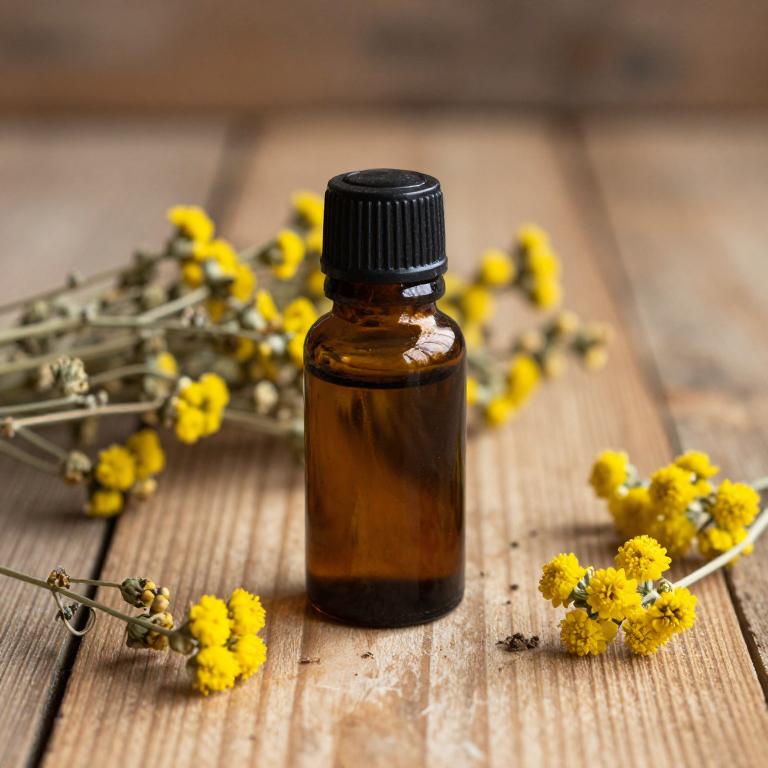10 Best Herbal Essential Oils For Throat Redness

Herbal essential oils, such as eucalyptus, peppermint, and thyme, are commonly used to alleviate throat redness due to their anti-inflammatory and antimicrobial properties.
These oils can be diluted with a carrier oil and applied topically to the throat area or used in steam inhalation to reduce irritation and soothe inflamed tissues. They are particularly effective in addressing symptoms caused by minor infections, allergies, or excessive throat clearing. However, it is important to use them cautiously, as some oils may cause skin irritation or allergic reactions if not properly diluted.
Always consult with a healthcare professional before using essential oils, especially for children or individuals with existing health conditions.
Table of Contents
- 1. Eucalyptus (Eucalyptus globulus)
- 2. Thyme (Thymus vulgaris)
- 3. Ginger (Zingiber officinale)
- 4. English lavender (Lavandula angustifolia)
- 5. Rosemary (Rosmarinus officinalis)
- 6. Ceylon cinnamon (Cinnamomum zeylanicum)
- 7. Melaleuca (Melaleuca alternifolia)
- 8. Oregano (Origanum vulgare)
- 9. Lemon balm (Melissa officinalis)
- 10. Salvia (Salvia officinalis)
1. Eucalyptus (Eucalyptus globulus)

Eucalyptus globulus, commonly known as Australian eucalyptus, is a popular source of herbal essential oils renowned for its therapeutic properties, particularly in alleviating throat redness.
The essential oil contains potent compounds like cineole and limonene, which exhibit anti-inflammatory and antimicrobial effects, helping to reduce irritation and infection in the throat. When used in inhalation therapy or diluted in a carrier oil, it can soothe soreness and promote healing of inflamed tissues. Its refreshing aroma also helps to clear nasal passages and ease breathing, making it a valuable natural remedy for respiratory discomfort.
However, it is important to use eucalyptus globulus essential oil with caution, as it may cause skin irritation or be toxic if ingested, so it should always be diluted properly before use.
2. Thyme (Thymus vulgaris)

Thymus vulgaris, commonly known as thyme, is a herb widely used in aromatherapy for its potent essential oil, which contains compounds like thymol and carvacrol.
These compounds have antimicrobial and anti-inflammatory properties that can help reduce throat redness and soothe irritation. When diffused or applied topically, thyme essential oil may provide relief from sore throats and respiratory discomfort. However, it is important to dilute the oil properly before use to avoid skin irritation.
Thyme essential oil is often recommended as a natural remedy for mild throat inflammation, though it should not replace professional medical advice for persistent or severe conditions.
3. Ginger (Zingiber officinale)

Zingiber officinale, commonly known as ginger, contains essential oils that have been traditionally used for their anti-inflammatory and soothing properties.
These essential oils, derived from the rhizome of the plant, include compounds like gingerol and zingiberene, which may help reduce throat redness by alleviating irritation and inflammation. When used in aromatherapy or as a diluted topical application, ginger essential oil can provide relief for sore throats and promote a sense of comfort. Its warming effect may also help improve circulation in the throat area, supporting faster healing.
However, it is important to dilute the oil properly and consult a healthcare professional before use, especially for those with sensitive skin or underlying health conditions.
4. English lavender (Lavandula angustifolia)

Lavandula angustifolia, commonly known as English lavender, is widely recognized for its calming and therapeutic properties, including its potential benefits for throat redness.
The essential oil derived from this plant contains compounds such as linalool and linalyl acetate, which possess anti-inflammatory and antiseptic qualities that may help reduce throat irritation. When used in steam inhalation or diluted in a carrier oil for gargling, lavender essential oil can provide soothing relief to inflamed throat tissues. Its aromatic properties also help ease respiratory discomfort and promote relaxation, which can indirectly support throat health.
However, it is important to use lavender essential oil safely, as it should always be diluted before application and avoided by individuals with known allergies or sensitivities.
5. Rosemary (Rosmarinus officinalis)

Rosmarinus officinalis, commonly known as rosemary, produces essential oils that are widely used for their therapeutic properties, including their ability to alleviate throat redness.
The essential oil of rosemary contains compounds like cineole and camphor, which have anti-inflammatory and antiseptic effects that can help reduce irritation and inflammation in the throat. When used in steam inhalation or diluted in a carrier oil, rosemary essential oil can provide soothing relief to a sore or red throat. Its warming and stimulating properties also help improve circulation, which may enhance the body's natural healing process.
However, it is important to use rosemary essential oil with caution, as it may be irritating to sensitive individuals and should always be diluted before application.
6. Ceylon cinnamon (Cinnamomum zeylanicum)

Cinnamomum zeylanicum, commonly known as cinnamon bark, is a rich source of aromatic essential oils that have been traditionally used for their therapeutic properties.
The essential oil derived from its bark contains compounds like cinnamaldehyde and eugenol, which possess anti-inflammatory and antimicrobial effects. These properties make cinnamon essential oil a valuable remedy for alleviating throat redness and discomfort caused by infections or irritation. When used in steam inhalation or diluted in a carrier oil, it can help soothe the throat and reduce inflammation.
Its warming and stimulating properties also support the body's natural healing processes, making it a versatile natural remedy for respiratory and throat health.
7. Melaleuca (Melaleuca alternifolia)

Melaleuca alternifolia, commonly known as tea tree oil, is a popular essential oil derived from the leaves of the Melaleuca alternifolia plant, native to Australia.
It is widely recognized for its potent antimicrobial and anti-inflammatory properties, making it a valuable natural remedy for throat redness caused by infections or irritation. When diluted properly, tea tree oil can be applied topically to the throat area or used in steam inhalation to help reduce inflammation and soothe discomfort. Its ability to combat bacteria and fungi may help alleviate symptoms associated with conditions like sore throat or pharyngitis.
However, it is important to use it safely, as undiluted essential oils can cause skin irritation or allergic reactions.
8. Oregano (Origanum vulgare)

Origanum vulgare, commonly known as oregano, is a popular herb used in the production of essential oils that have been traditionally valued for their therapeutic properties.
The essential oil derived from oregano contains high concentrations of compounds such as carvacrol and thymol, which possess antimicrobial and anti-inflammatory effects. These properties make oregano essential oil a potential natural remedy for alleviating throat redness caused by infections or irritations. When used in steam inhalation or diluted in a carrier oil for topical application, it can help reduce inflammation and soothe throat discomfort.
However, it is important to use the oil with caution and consult a healthcare professional before incorporating it into a treatment regimen.
9. Lemon balm (Melissa officinalis)

Melissa officinalis, also known as lemon balm, is a popular herb known for its calming properties and potential therapeutic benefits.
Its essential oil, derived through steam distillation of the fresh leaves, contains compounds such as citral, linalool, and geraniol, which are believed to have anti-inflammatory and antiviral properties. When used for throat redness, melissa essential oil can help reduce irritation and soothe inflamed tissues, making it a valuable natural remedy. It is often diluted with a carrier oil before application to the throat or inhaled via steam to ease discomfort.
Overall, melissa officinalis essential oil offers a gentle yet effective approach to managing throat redness and promoting respiratory wellness.
10. Salvia (Salvia officinalis)

Salvia officinalis, commonly known as sage, contains essential oils that have been traditionally used to alleviate throat redness due to their anti-inflammatory and antimicrobial properties.
The primary components of sage essential oil, such as thujone, cineole, and camphor, contribute to its soothing effects on the throat lining. When diluted properly, sage essential oil can be used in steam inhalations or as a gargle to reduce irritation and inflammation associated with sore throats. Its ability to inhibit bacterial growth makes it particularly effective in treating throat infections.
However, it is important to use sage essential oil with caution, as it can be potent and may cause irritation if not properly diluted.